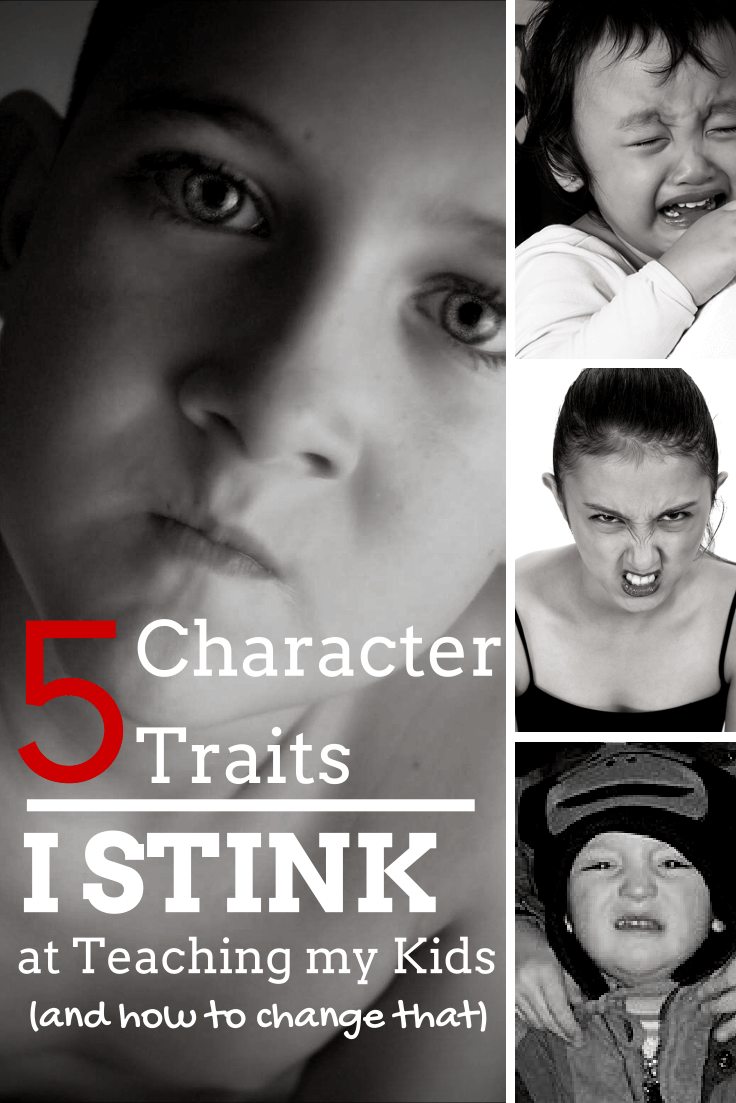You can teach what you know, but you reproduce what you are.
The profound truth of the above statement scares me every time I read it. There were days when my children were very young—too young to even understand my words—that I leaned in and whispered, “I’m so sorry you have such an oaf for a father.”

Now that my kids are all old enough to not only understand my words but mimic my actions and attitudes, I find myself challenged at every turn. The things I find most annoying and disappointing about my kids are often the traits I hate most about myself.
If you ever think to pray for random bloggers you bump into online, please write these character traits with my name next to them.
1. Patience vs. Instant Gratification
We live in a world where we easily freak out when the Internet connection is poor, causing our web pages to load in 10 seconds rather than 2. We get mad when fast food isn’t so fast. We are upset when traffic makes us 10 minutes later than we expected. Many things in our culture are based around instant access: waiting is a thing of the past—or at least we think it should be.
There are days I wonder whether all the convenience is training our brains for impatience. I see it in myself. I see it in my children. This conversation takes place at least 3 times a week in my home:
Child: I want a drink.
Me: Say, “I want a drink, please.”
Child: I want a drink now.
Me: [Stunned silence, accompanied by a look of utter disdain.]
Child: I want a drink, please.
Me: Okay, when I’m done drying this dish, I get you one.
Child: [3 seconds later] You said you would get me a drink!
Me: I’m sorry, your majesty, I guess I didn’t speak loud enough when I told you the drink was coming. If you don’t settle down I’m going to give you a drink without the cup.
Michael and Carlie Kercheval from Learning To Speak Life have a wonderful suggestion from their book, The Fruit of the Spirit:
Have each family member name one area that he/she needs to work on having more patience in. Write down each family member’s name. Next to each name, write down the area in which that person needs to develop more patience. Next, come up with a strategy, as a family, to help each other overcome this area through serving one another. It could be through increased prayer, helping someone with something he/she feels overwhelmed in, showing different methods to achieve the same goal, etc. Have a family meeting in one week to see how you are progressing and to pray and encourage one another to continue improving in this area.
2. Thankfulness vs. Discontentment
I would like to consider myself a thankful person, but usually it takes just one thing going wrong in my life to tip the apple cart of contentment. I know my kids see it, too: one moment I’m saying a prayer of thanks to God, and the next minute I’m grumpy because my new grill assembly is missing a few screws (true story).
It probably shouldn’t surprise me when I see epic levels of ingratitude in my children. In just a few hours, these are the kind of conversations I can have in my home:
Child A: “You put curry on the chicken tonight. I’m not eating. This is gross.”
Me: “That’s okay. I’ll make sure to mail your gross food to the starving Sudanese refugees tonight.”
Child B [Screaming]: “My Spiderman PJs are still dirty! Why didn’t you wash them? I don’t want to wear Toy Story!”
Me: “I’m sorry, Peter Parker, I didn’t know your spidey sense was tingling.”
Child A: “I only got to play Skylanders for 30 minutes!”
Me: “You’re right. That’s totally unfair. I’ll make sure to ship our TV and Wii off to the orphans in Haiti because they’ve never seen a screen in their life.”
Amanda Pelser of Kids In The Word has a number of great suggestions in her book Be Thankful: Cultivating Year-Round Thankfulness. For instance, she writes:
- “Draw a picture or write a song or poem in the pattern of Psalm 107 or Psalm 136, listing ways that God has worked in your life and/or that of your family.” I think I’m going to do with with my kids for family devotions.
- “Consider starting a prayer journal that lists God’s acts in your life. Be sure to look back and read your journal from time-to-time, especially when you feel God is not hearing a specific prayer.” What a great legacy to leave your children as they get older.
3. Kindness vs. Provoking
No one can push my 5-year-old’s buttons like my 9-year-old. No one. Sometimes I stand in awe at how shrewd and calculating the agitator can be. We’re not talking about in-your-face-total-jerkyness. We’re talking about one snide or sarcastic remark, one simple utterance that can acts like a guided missile into the tenderest place in his brother’s soul and that catalyzes a total meltdown.
I think, “Where did my kids learn this kind of rife sarcasm and total disregard of one another’s feelings?” Then I consider all the times I’m prone to do the same thing: I too know how to say things to them in a way that I know is likely to get under their skin.
In her books The ABCs for Godly Boys and The ABCs for Godly Girls, Lindsey Stomberg from The Road to 31 has some great ideas about helping kids understand the importance of kindness—speaking only words that will edify others and build them up.
- “Activity: Act out a situation where you or your son might say something mean to a neighbor, and then talk about the hurt feelings that it might bring. Then act out saying nice things to that same friend. Discuss the good feelings and confidence that they might give and how it makes one feel good to make someone else feel good about themselves.”
- “Craft: Write a “Just Because” card to a friend or family member. If your child is not of the writing age yet, have him tell you what he would like to say, and then let him decorate it. In this card, say only nice things about that person to build them up. Say a prayer for God’s blessing on this person before mailing it.”
4. Prayerfulness vs. Independence
Our family has the standard prayerful habits: bedtime prayers, mealtime prayers, and the occasional prayer when a child stubs a toe. But sadly, prayerfulness is not a virtue I’ve been able to diligently teach my children.
By prayerfulness I don’t mean that my kids don’t expect us to pray, but that when obstacles in life arise, they don’t see in me the “gut instinct” to pray about it.
We’ve gotten our oldest into the habit of reading his Bible daily—and by “habit” I mean I ask him every morning if he read his Bible yet, and he says no, and I say, “Then go do that.” We have not, however, done much to emphasize the importance of private prayer. I think this is because—if I am brutally honest with myself—I’m in a dry season where private prayer has not been all that important to me.
Sara Shay, in her book God Gifted Virtues, offers a simple outline for the Lord’s Prayer kids can follow every time:
- Worship Him
- Surrender to His will
- Trust Him to provide for us
- Thank Him for grace
- Ask for help
Since I’ve encouraged my kids to memorize the Lord’s Prayer, I want to help them understand in simple language how it applies to their lives.
5. Joyfulness vs. Grumpiness
Little things impact our mood. Not enough sleep. Too much sleep. Hunger. Minor physical pains. The grumpiness of others. There are days in our home when my kids have about as much bedside manner as Oscar the Grouch. There are days I can say the same about myself.
It never ceases to amaze me how forgetful we are: walking around in the world as if our greatest problem in life isn’t solved (i.e. my sins are forgiven and I’m a child of the Living God).
If you asked my kids, “What makes your dad happy? What brings him the greatest joy?” I’m not sure what they would say. Perhaps after a good week they might say, “Jesus is Daddy’s greatest joy,” but chances are they might say something like, “Happy? What is this ‘happy’ you speak of?”
Another great tool for parents are the Character Badges from Caroline at The Modest Mom Blog. These character training charts include bad behaviors like pouting, disobedience, and cruelty, as well as good behaviors like good manners, helpfulness, and diligence. Every chart comes with special character badges that you can award to your kids for manifesting good behaviors, and Bible verses associated with each badge. One virtue that I know I’ll love rewarding my children for is cheerfulness and joy. “These things I have spoken unto you, that in me ye might have peace. In the world ye shall have tribulation: but be of good cheer; I have overcome the world” (John 16:33).










Leave a Comment